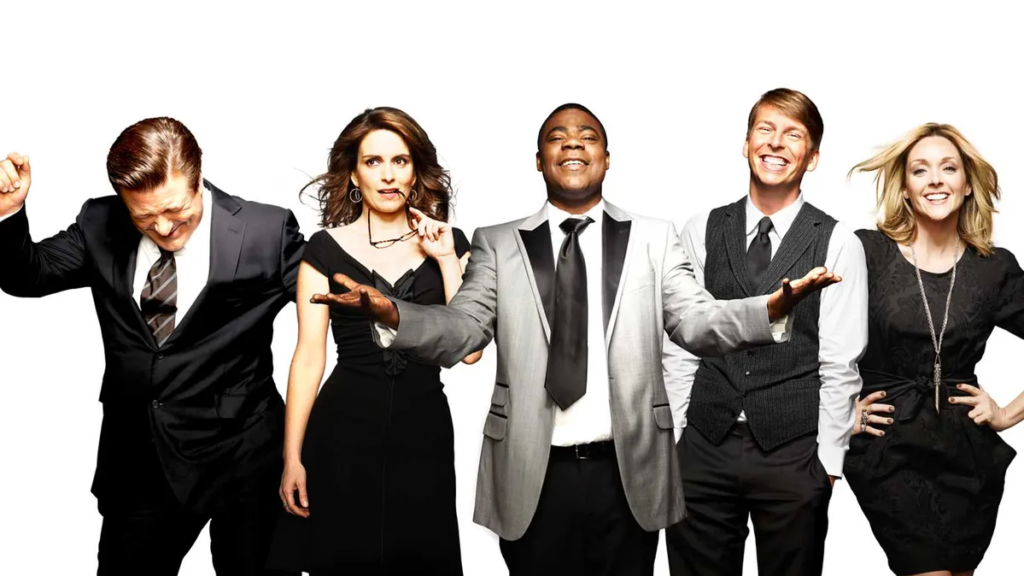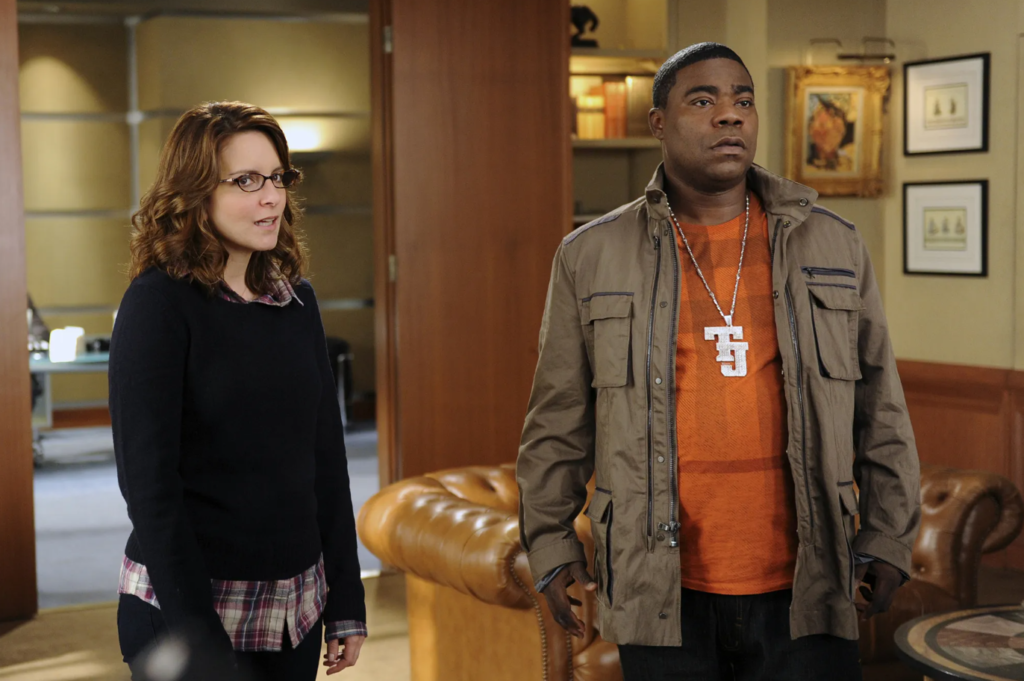
I found a nursing home off the coast of Maine and run by the same French company that oversaw Napoleon’s exile. She will be treated humanely, but there will be no escape. – Jack Donaghy
NBC’s 30 Rock, widely celebrated as one of the greatest comedy series of all time, has always been a comfort home to me, cheering me up at my lowest without exceptions. Created by the multi-talented, comedic genius Tina Fey, the show offers a satirical behind-the-scenes look at a fictional live sketch comedy show, “TGS with Tracy Jordan,” which is filmed at 30 Rockefeller Plaza in New York City. The series follows Liz Lemon (Tina Fey), the head writer of “TGS,” as she navigates the challenges of managing an eccentric cast and crew, including her arrogant new boss Jack Donaghy (Alec Baldwin) and unpredictable, loose-cannon movie star Tracy Jordan (Tracy Morgan). 30 Rock is renowned for its rapid-fire humor, clever wordplay, chaotic interactions between characters, absurdist twists, and a striking balance between silliness and sophistication, all of which contribute to its unique comedic style. The show’s setting in the iconic 30 Rockefeller Plaza adds a layer of authenticity and nostalgia, as it is the real-life headquarters of NBC and the home of Saturday Night Live, from which 30 Rock draws much of its inspiration.
I already have a drink, do you think he’d buy me mozzarella sticks? – Liz Lemon
The narrative of 30 Rock revolves around the weird dynamic, mentor-mentee relationship, and unlikely friendship between the two very different personalities of Liz Lemon and Jack Donaghy. Liz is liberal, sarcastic, sometimes insecure, focused on her work, and has a tedious personal life, whereas Jack is conservative, supremely confident, and career-driven. As the show progresses, they develop a close friendship and professional partnership. Jack tries to mentor Liz in business and her personal life, often with mixed results. As a result of the mutual influence, Liz becomes more confident and accomplished in her career and personal life, and Jack softens some of his harsher edges and learns to value relationships.
30 Rock excels in its use of meta-humor and self-referential comedy, often breaking the fourth wall and making jokes about its own production and the television industry at large. The show-within-a-show format, centered around the fictional sketch comedy show “TGS with Tracy Jordan,” allows for a unique blend of satire and farce. 30 Rock the series frequently employs cutaways and surreal humor to underscore its themes, creating a layered comedic experience that appeals to a discerning audience. Such a meta-comedy not only provides laughs but also offers a critique of the entertainment industry, making 30 Rock a show that is both hilarious and thought-provoking. Also, another distinctive feature of the series is its rapid-fire joke delivery and high joke density. 30 Rock is renowned for packing an extraordinary number of jokes into each episode and even each line. According to The Atlantic, 30 Rock averages an impressive 7.44 jokes per minute, a figure that outpaces many other popular comedies of its time. This relentless pace ensures that viewers are constantly engaged, with humor that ranges from obvious punchlines to subtle, blink-and-you-miss-it gags. The high joke density not only keeps the audience entertained but also makes the show highly rewatchable, as viewers often discover new jokes upon subsequent viewings.
Well, it must be psychosomatic. Now don’t worry, that’s just a fancy doctor word for ‘your brain is broken’. Unfortunately there’s no field of medicine that deals with the brain but I can give you a pamphlet for a cult. – Dr. Spaceman
30 Rock is rich with pop culture references and clever wordplay, making it a treasure trove for fans of smart, sophisticated humor. The show frequently alludes to real-life events, celebrities, and other television shows, creating a tapestry of cultural commentary that resonates with a wide audience. Episodes like “Succession” and “Sandwich Day” are prime examples of how the series uses pop culture references to enhance its storytelling and comedic impact. The wordplay in 30 Rock is another hallmark of its writing style. The dialogue is peppered with puns, double entendres, and linguistic jokes that showcase the writers’ linguistic dexterity, not only entertaining but also challenging the audience to keep up with the rapid-fire wit. Additionally, 30 Rock is also celebrated for its sharp satire and insightful social commentary. The show parodied the complex corporate structure of NBC and its then-parent company, General Electric, using surreal humor to highlight the absurdities of the corporate world. This approach resonated with audiences who were familiar with the inner workings of the media industry, as well as those who appreciated the show’s satirical take on corporate culture. The series also tackled various social issues, often through the lens of humor. For instance, it addressed topics such as gender roles, racial stereotypes, and the challenges faced by women in the workplace. By doing so, 30 Rock contributed to broader conversations about these issues, making it a culturally significant show beyond its comedic value.

30 Rock played a significant role in shaping the landscape of television comedy in the late 2000s and early 2010s with its unique blend of cutting satire, whimsical absurdity, and self-referential, dark humor. The show’s success helped to solidify Tina Fey’s status as a leading figure in comedy and paved the way for other female-driven comedies such as Parks and Recreation and The Unbreakable Kimmy Schmidt. Additionally, 30 Rock‘s portrayal of the television industry and corporate culture has also been the subject of academic analysis, with scholars examining its critique of neoliberalism, postfeminism, and post-racial discourse. The series’s willingness to be crass, politically incorrect, and downright bizarre set it apart from more conventional shows, pushing the boundaries of what situational comedy could accomplish.
They have to have the drive and ambition to be worth my time. The intelligence to understand the challenges they’re going to face. The humility to accept my help. And finally, a life that is a bottomless swamp of chaos. Drive, intelligence, humility, chaos, or the acryonym DIHC. I’m looking for DIHC, Avery, and I’m going to take it wherever I can find it. – Jack Donaghy
